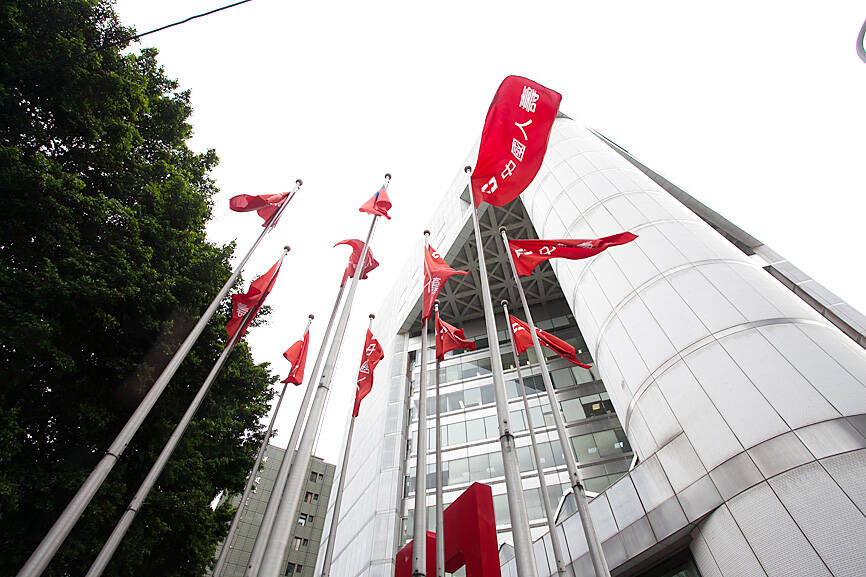China Life Insurance Co (中國人壽) yesterday said it would reclassify its financial assets under the International Financial Reporting Standards 9 (IFRS 9) to improve its financial strength, following in the footsteps of its peers to cushion itself against rapidly rising interest rates.
The asset reclassification would boost China Life’s shareholders’ equities by about NT$30 billion (US$932 million) and raise its equity-to-asset ratio by 1.3 percentage points, parent company China Development Financial Holding Corp (中華開發金控) said in a filing with the Taiwan Stock Exchange on Thursday.
China Life’s equity-to-asset ratio, a gauge of a life insurer’s capital adequacy, stood at 4.03 percent at the end of June, higher than the Financial Supervisory Commission’s (FSC) threshold of 3 percent, company data showed.

Photo courtesy of China Life Insurance Co
China Life is the fifth local life insurer to reclassify its financial assets, after Nan Shan Life Insurance Co (南山人壽), Cathay Life Insurance Co (國泰人壽), Taiwan Life Inasurance Co (台灣人壽) and Shin Kong Life Insurance Co (新光人壽).
By reclassifying their assets, these insurers have been able to raise their shareholders’ equities by about NT$650 billion in total.
The commission on Oct. 11 said that local life insurers can use one of three accounting methods to recalculate the value of their investments: amortized cost (AC), fair value through comprehensive income (FVOCI) and fair value through profit and loss (FVTPL).
Unlike the AC method, the FVOCI and FVTPL methods reflect changes in bond prices, so life insurers the latter two methods are vulnerable to plunges in bond prices when the market rate goes up.
Reclassification allows insurers to change to amortized cost, thereby protecting their investment value from rate hikes.
However, FSC Chairman Thomas Huang (黃天牧) on Wednesday expressed disapproval over a proposal by life insurers to change the accounting method for liabilities.
“There should be a consistency in the way financial reports are made. Thus, we still have concerns about such a proposal,” Huang told a meeting in Taipei.
For example, changing the accounting method for liabilities might seem beneficial when interest rates rise, but it would not be favorable when interest rates fall, he said, adding that accounting principles should not be changed frequently.

Taiwan’s long-term economic competitiveness will hinge not only on national champions like Taiwan Semiconductor Manufacturing Co. (TSMC, 台積電) but also on the widespread adoption of artificial intelligence (AI) and other emerging technologies, a US-based scholar has said. At a lecture in Taipei on Tuesday, Jeffrey Ding, assistant professor of political science at the George Washington University and author of "Technology and the Rise of Great Powers," argued that historical experience shows that general-purpose technologies (GPTs) — such as electricity, computers and now AI — shape long-term economic advantages through their diffusion across the broader economy. "What really matters is not who pioneers

In a high-security Shenzhen laboratory, Chinese scientists have built what Washington has spent years trying to prevent: a prototype of a machine capable of producing the cutting-edge semiconductor chips that power artificial intelligence (AI), smartphones and weapons central to Western military dominance, Reuters has learned. Completed early this year and undergoing testing, the prototype fills nearly an entire factory floor. It was built by a team of former engineers from Dutch semiconductor giant ASML who reverse-engineered the company’s extreme ultraviolet lithography (EUV) machines, according to two people with knowledge of the project. EUV machines sit at the heart of a technological Cold

Taiwan Semiconductor Manufacturing Co (TSMC, 台積電) last week recorded an increase in the number of shareholders to the highest in almost eight months, despite its share price falling 3.38 percent from the previous week, Taiwan Stock Exchange data released on Saturday showed. As of Friday, TSMC had 1.88 million shareholders, the most since the week of April 25 and an increase of 31,870 from the previous week, the data showed. The number of shareholders jumped despite a drop of NT$50 (US$1.59), or 3.38 percent, in TSMC’s share price from a week earlier to NT$1,430, as investors took profits from their earlier gains

TAIWAN VALUE CHAIN: Foxtron is to fully own Luxgen following the transaction and it plans to launch a new electric model, the Foxtron Bria, in Taiwan next year Yulon Motor Co (裕隆汽車) yesterday said that its board of directors approved the disposal of its electric vehicle (EV) unit, Luxgen Motor Co (納智捷汽車), to Foxtron Vehicle Technologies Co (鴻華先進) for NT$787.6 million (US$24.98 million). Foxtron, a half-half joint venture between Yulon affiliate Hua-Chuang Automobile Information Technical Center Co (華創車電) and Hon Hai Precision Industry Co (鴻海精密), expects to wrap up the deal in the first quarter of next year. Foxtron would fully own Luxgen following the transaction, including five car distributing companies, outlets and all employees. The deal is subject to the approval of the Fair Trade Commission, Foxtron said. “Foxtron will be